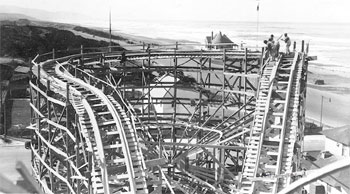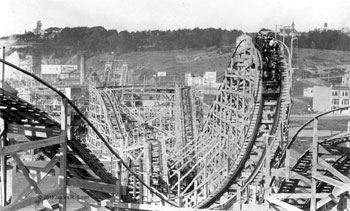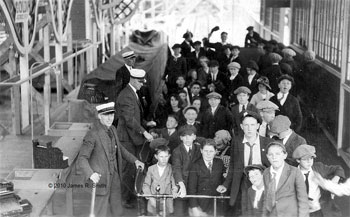
|
|
|
|
|
|
|
|
|
|
|

The following is excerpted from Playland at the Beach - The Early Years  In 1913, Arthur Looff and John Freidle formed a partnership to create an amusement
park, located at Ocean Beach on the Great Highway, called Concessions at the
Beach. Looff owned the Hippodrome, housing the first of San Francisco's three
famous carousels, and Freidle owned a shooting gallery and a baseball knockdown
game called Babyland.
In 1913, Arthur Looff and John Freidle formed a partnership to create an amusement
park, located at Ocean Beach on the Great Highway, called Concessions at the
Beach. Looff owned the Hippodrome, housing the first of San Francisco's three
famous carousels, and Freidle owned a shooting gallery and a baseball knockdown
game called Babyland.
That meager start grew to ten major attractions and countless arcades by 1921, including the Shoot-the-Chutes water ride. By then the park had taken on the name of its top attraction, billed as Chutes at the Beach. The remaining nine attractions were the Bob Sled Dipper roller coaster (Bobs), the Aeroplane Swing, the Whip, Dodg `Em, the Ship of Joy, the Ferris Wheel, the Looff Carousel, Noah's Ark, and the scenic railway Figure 8 gravity coaster. The demolition of the Figure 8 began in late April 1922; within two months Looff and Freidle started building the Big Dipper roller coaster. It was relocated a bit south, leaving just enough room to build the Fun House, home to Laffing Sal. Photos of that process make it seem the Big Dipper was actually eating its way through the Figure 8. Completed in two months, the results proved to be worth the effort. The Big Dipper soon became Chutes' premier attraction.  Arthur Looff claimed to be the designer and builder, and credited for the Giant Dipper
at Santa Cruz. However, there is no evidence to support his role as designer. Looff was
connected to Prior & Church and both the Bob Sled Dipper and the Big Dipper appear to be
Prior & Church designs. Regardless, he was a veteran businessman and showman and saw to
it that the Big Dipper elicited the screams required to make it an instant sensation.
Arthur Looff claimed to be the designer and builder, and credited for the Giant Dipper
at Santa Cruz. However, there is no evidence to support his role as designer. Looff was
connected to Prior & Church and both the Bob Sled Dipper and the Big Dipper appear to be
Prior & Church designs. Regardless, he was a veteran businessman and showman and saw to
it that the Big Dipper elicited the screams required to make it an instant sensation.
There were a number of accidents and lawsuits during the life of the ride. In 1924, a young lady riding the Big Dipper stood up in a fit of ecstasy and jumped from the car as it neared the bottom of the drop. She struck the ride's braces, breaking her leg in two places and laying open her scalp. In another incident, sailor Edward Tobiaski of Chicago, on leave from the war in the Pacific in 1945, rode the Big Dipper in the rear row of seats with Bernice Bernsten. He repeatedly tried to stand up and when the ride was half completed, his head struck a massive support when he stood up, killing him instantly. That event likely spawned the urban legend about a sailor standing up in a car, losing his head and that head landing in the lap of a girl in a car below.  George and Leo Whitney bought the park in 1929, renaming it Playland at the Beach. The
Big Dipper continued to offer up its thrills until 1955 when new safety regulations
encouraged its replacement. The Alpine Racer, a copy of the Wild Mouse ride at Santa
Cruz took its place.
George and Leo Whitney bought the park in 1929, renaming it Playland at the Beach. The
Big Dipper continued to offer up its thrills until 1955 when new safety regulations
encouraged its replacement. The Alpine Racer, a copy of the Wild Mouse ride at Santa
Cruz took its place.
Bill Smidt, whose father operated the Big Dipper from the 1920s through to the very end, stated that a popular misconception was that the ride needed massive maintenance. Bill insists the reason the Dipper was dismantled in October of 1955 was strictly monetary. It no longer brought in the big money it had in its heyday. By removing it, George Whitney was able to replace it with ten other attractions including the Limbo dark ride. Regardless of why it was dismantled, there has been more love, lore and focus placed on the Big Dipper than any other Playland attraction, with the possible exception of Laffing Sal. |
|
|
|
|
Copyright 2004-2013 by All rights reserved. |